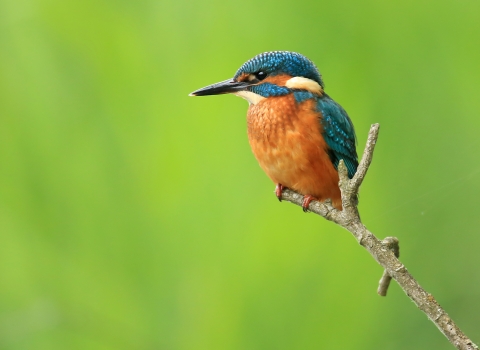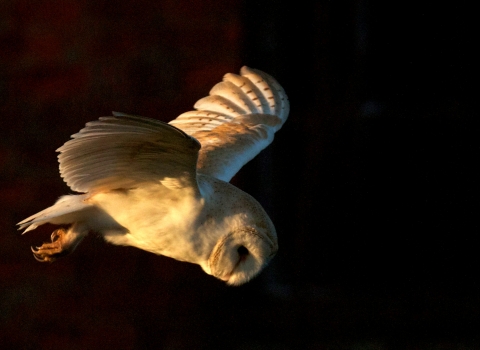Wildlife for wellbeing
Spending time in nature is proven to be good for our mental health. Watching wildlife - whether at home, in a park or at a nature reserve can lift our mood and alleviate stress. This channel brings the two together. When you can't be in your favourite place or are too far to visit, you can tune in to some of our special wildlife here instead and take in some 'slow TV'.
Wildlife
Wildflowers in churchyards (https://www.youtube.com/watch?v=cHBE6itCE2U)
Hampshire and Isle of Wight Wildlife Trust
Education Officer, Susan Simmonds from Hampshire and Isle of Wight Wildlife Trust, talks to us about wildflowers and how churchyards can be really important havens for wildlife.
Dandelion (https://www.youtube.com/watch?v=8Lquj48qohQ)
Hampshire & Isle of Wight Wildlife Trust
Education Officer, Susan Simmonds from Hampshire Wildlife Trust, talks to us about the dandelion. Often thought of as a 'weed' of grassy places, this familiar flower has a range of benefits for a variety of insects.
View from the hide at Catcott (https://www.youtube.com/watch?v=tYOpxTLmWgM)
Somerset Wildlife Trust / Chris Hancock
A short clip of the view from the car park hide at Catcott Nature Reserve.
Painted butterflies (https://youtu.be/kG02_Itxp8c)
Surrey Wildlife Trust
Watch this painted lady butterfly.
House martins collecting mud (https://youtu.be/sJD9XJaPcX0)
Devon Wildlife Trust
Watch these house martins collecting mud to build their nests.
Cattle Egrets at Catcott (https://youtu.be/EADkdIAMdlQ)
Somerset Wildlife Trust
Cattle egrets enjoying the new scrape at our Catcott Lows reserve.
How to look after water voles (https://www.youtube.com/watch?v=YfRsHua_1IA)
Essex Wildlife Trust
Learn about protecting our water voles.
A flutter of butterflies at South hill (https://www.youtube.com/watch?v=eZw8MUfCWPA)
Somerset Wildlife Trust/ Chris Hancock
A beautiful flutter of butterflies at South Hill.
Barn owls
Kirby, our Head of Communications and Corporate Relations, set up a camera in her barn and caught these videos of Barn owls!
Barn owls having lunch
Barn owls practising their head bobbing
Barn owl has night out 'at the bar'
Barn owl meets his brother 'at the bar'
Barn owl dad brings home dinner for all
Barn owl gulps down dinner in one
Barn owls have a quick 'fly-thru' dinner
Coastal wildlife
Our coast is home to some of the most fantastic and charismatic wildlife. These wonderful little videos capture some of these characters absolutely brilliantly and reveal the very special skills they have. Make sure you turn up the volume too!
The solar powered sea slug
The solar powered sea slug (https://www.youtube.com/watch?v=hT5J0-SuOWw&t=15s)
Somerset Wildlife Trust
Elysia viridis the sap-sucking slug, is a small-to-medium-sized green sea slug. It can be found from the intertidal zone to a depth of 5m.
The St Piran's Crab
The St Piran's Crab (https://www.youtube.com/watch?v=_tIYRfyJ8Hs)
Somerset Wildlife Trust
St Piran's Crab is an interesting hermit crab species. In 2016 the BBC Springwatch programme highlighted it and ran a competition to provide a vernacular name. The winning name was St Piran's Crab.
The Little Cuttlefish
the little cuttlefish (https://www.youtube.com/watch?v=tPUYXo6B-Dg)
Somerset Wildlife Trust
The Little Cuttlefish (Sepiola atlantica) is a species of bobtail squid and can grow to around 21mm in length.
The Shanny
The Shanny (https://www.youtube.com/watch?v=fPem2uTj5sU)
Somerset Wildlife Trust
The Shanny (Lipophrys pholis), is a species of combtooth blenny. It feeds primarily on crustaceans and takes about two years to mature.
The Montagus Blenny
The Montagus Blenny (https://www.youtube.com/watch?v=fsCx-8HC_10)
Somerset Wildlife Trust
Montagu's Blenny (Coryphoblennius galerita) is a species of combtooth blenny found around rocky shores with much wave action. It can grow up to 7.6cm in length.
The Greater Pipefish
The Greater Pipefish (https://www.youtube.com/watch?v=p3pBfKZpOi8)
Somerset Wildlife Trust
The Greater Pipefish (Syngnathus acus) is a seawater pipefish. It's latin name derives from the Greek symphysis (meanging 'grown together') gnathos (meaning 'jaw') and acus (meaning 'needle').
The European Lobster
The European Lobster (https://www.youtube.com/watch?v=zRybT3MLuTY)
Somerset Wildlife Trust
The European Lobster (Homarus gammarus) or Common Lobster can grow up to 60cm in length and weigh up to 6kg, and have a large pair of claws. contrary to popular belief European Lobsters are actually blue in colour (and only turn red when cooked).
The Black Squat Lobster
The Black Squat Lobster (https://www.youtube.com/watch?v=vcqptVP78DI)
Somerset Wildlife Trust
The Black Squat Lobster (Galathea squamifera) or Montagu's Plated Lobster can grow up to 65 mm in length and is the most commonly found species of lobster on the shores of Northern Europe, living between the low water mark and depths of 70m.
The Common Prawn
The Common Prawn (https://www.youtube.com/watch?v=tEzI8HEdtaQ)
Somerset Wildlife Trust
Common Prawn (Palaemon serratus) like most prawns has an external skeleton (exo-skeleton) made up of six abdominal segments and can grow up to 11cm in length.
The Spiny Squat Lobster
The Spiny Squat Lobster (https://www.youtube.com/watch?v=rvN4GotJ_Yk)
Somerset Wildlife Trust
The Spiny Squat Lobster (Galathea strigosa) looks like a mini-lobster or crab with red and blue stripes and long narrow claws.
Wellbeing
Natural ways to wellbeing (https://www.youtube.com/watch?v=B0snHJqDpGM)
Bedfordshire, Cambridgeshire & Northhamptonshire Wildlife Trust
Dr Amir Khan explains how a natural approach to health can have a positive impact on a person's wellbeing.
Keep up to date with our work across the county
Sign up below to receive the latest news from Somerset Wildlife Trust, learn about great events near you and learn how you can help wildlife in your local area.



